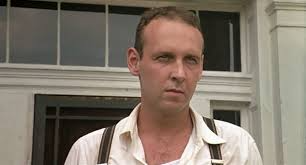
A Dangerous Man Returns
Frank Bennett’s reappearance in Whistle Stop is more than a threat — it’s a powder keg waiting to explode. Years after Ruth Jamison escaped his abusive grasp, he resurfaces with a single goal: to take back his son, Buddy Jr., by force if necessary. The audience already knows Frank as a violent, controlling man — a hidden monster beneath Southern charm — and his sudden return heightens tension to the breaking point.
Unlike the law, which often looks away from domestic abuse, the people of Whistle Stop understand who Frank is and what he’s capable of. And more importantly, they understand what’s at stake if he succeeds.
Sipsey’s Act of Protection
When Frank shows up and tries to take the child, what unfolds is both shocking and quietly righteous. Sipsey, the older Black caretaker played with depth and strength by Cicely Tyson, steps in to stop him. With no time for speeches or hesitation, she does what the law never could — she ends the threat. Her weapon: a cast-iron skillet. Her motive: pure maternal instinct.
It’s a moment of justice not given by the system, but taken by someone the system routinely ignores. Sipsey doesn’t act out of revenge — she acts out of love and protection. It’s a scene that redefines heroism, placing it in the hands of a Black woman who refuses to let violence win.
Covering the Truth

What follows is one of the film’s most memorable and morally complex twists. Idgie and Big George — two unlikely co-conspirators — take on the task of hiding the body. Rumors swirl. The local law is suspicious. But the Whistle Stop Café remains oddly serene. That is, until one of the film’s darkest and most humorous lines is uttered: “The secret’s in the sauce.”
It’s strongly implied (though never explicitly confirmed) that Frank’s body was cooked and served as barbecue. The film walks a tightrope here — blending Southern gothic horror with absurd comedy — but it never loses sight of the point: community will do what it must to protect its own.
The Town’s Unspoken Agreement
The town never turns on Idgie, Big George, or Sipsey. They look the other way — not because they’re immoral, but because they understand justice in a way the law never has. Whistle Stop becomes a character in itself, unified by shared secrets and moral clarity that doesn’t always align with legality.
This collective silence isn’t just about hiding a crime; it’s about recognizing that sometimes, the law serves power, not justice. And when that happens, people — especially women and marginalized communities — take justice into their own hands.
A Crime That Wasn’t a Crime
By the time the police investigation fades, the viewer is left with a strange but satisfying realization: Frank Bennett isn’t missed. No one mourns him. No one wants him back. In a world where villains often get away with too much, Fried Green Tomatoes offers rare catharsis. A bad man disappears, and good people survive.
This moment in the film dares to ask: What if the wrong thing was also the right thing? And what if justice sometimes wears the face of a cook, a Black nanny, or a fierce woman with no patience for abusers?
Frank Bennett’s disappearance isn’t just a mystery — it’s a moral turning point in Fried Green Tomatoes. It challenges viewers to think about justice, community, and the limits of the law. Through dark humor and emotional truth, the film shows us that sometimes, protecting your family means breaking the rules. And in Whistle Stop, the bonds of love are stronger than fear — even fear of getting caught.
